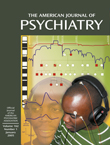Increase in Interleukin-1β in Late-Life Depression
Abstract
OBJECTIVE: Depression has been associated with increases in circulating cytokines in younger adults, and there is evidence for prefrontal inflammation in late-life depression. The authors tested the hypothesis that levels of cytokine interleukin-1β (IL-1β) would be higher in subjects with late-life major depression. METHOD: Serum levels of IL-1β were measured in three groups of subjects who were older than 60: 19 subjects with major depression, 20 subjects with subsyndromal depression, and 21 healthy comparison subjects. The Montgomery-Åsberg Depression Rating Scale and the Geriatric Depression Scale were used to assess severity of depression. RESULTS: Compared with healthy subjects, those with major depression had significantly higher levels of IL-1β (170%); the higher levels of IL-1β strongly correlated with current depression severity. There were no significant differences between subjects with subsyndromal depression and the other two groups. CONCLUSIONS: These findings support the existence of an inflammatory response, which may be state dependent, in late-life depression.



